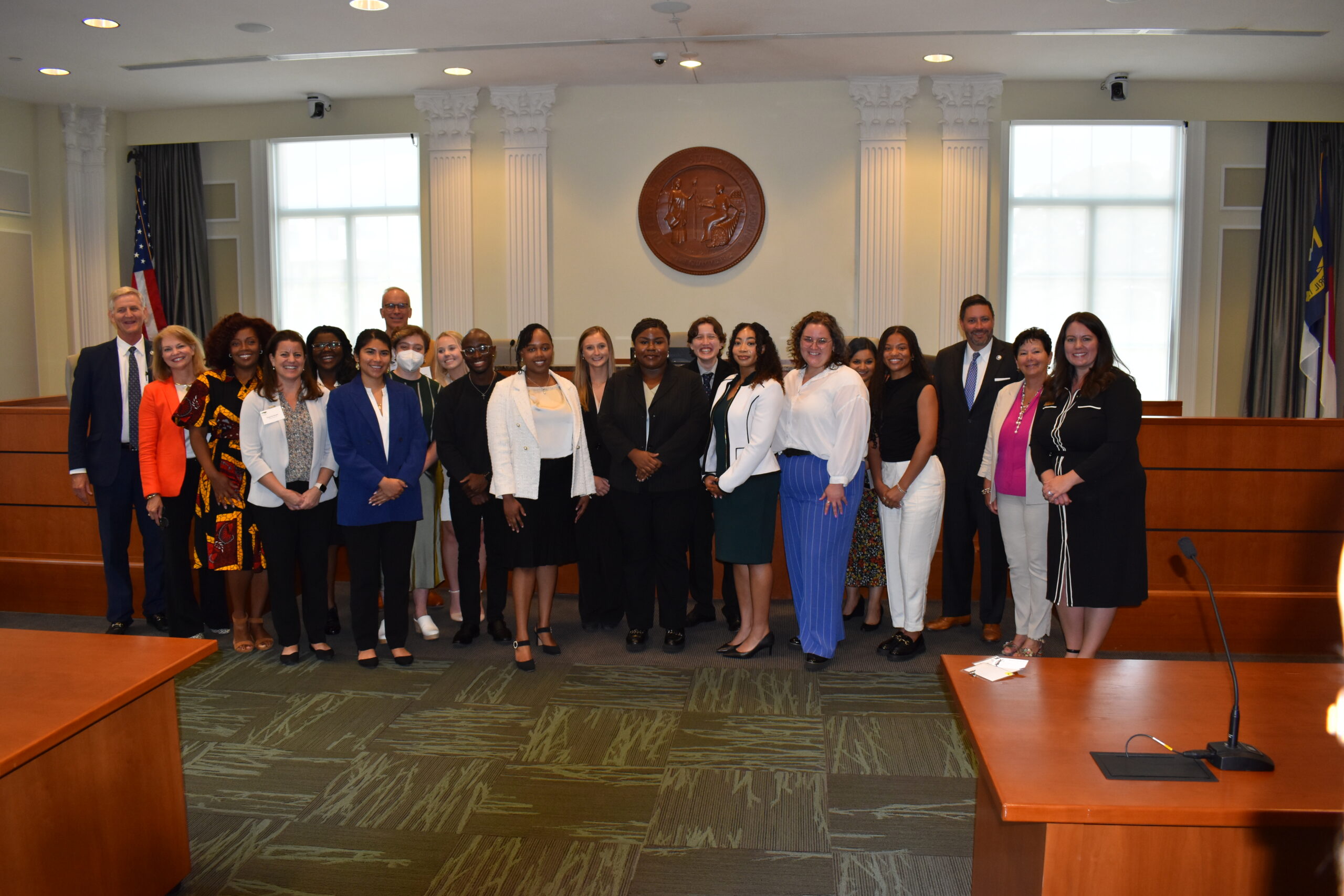IOLTA Inspirations: Reflections on Summers Past and Present at the Courthouse
In 2024, NC IOLTA reestablished the Public Interest Internship Program, which provides grants to accredited North Carolina law schools to support stipends for students pursuing summer public interest internships. Each of North Carolina’s six accredited law schools receives up to $50,000 to allocate to students who will work in North Carolina counties designated as a legal desert. Eligible student placements include NC-based nonprofit organizations that provide free civil legal services to low-income individuals, public defender offices, district attorney offices and courts across the state working under the supervision of a judge.
Here, Judge Tom Langan and PIIP interns Emmy Scott and Mary McCullough reflect on their experiences — and the impact such opportunities can make in addressing the shortage of lawyers in many counties of North Carolina.
After completing my first year of law school at Wake Forest in 1996, I decided to spend the summer interning for Judge Catherine C. Eagles. Judge Eagles had recently been appointed to the Superior Court bench in Guilford County, and a stipend was available for me to intern with her. The “clerkship” was funded through resources dedicated to public interest opportunities within North Carolina.
The most memorable case from the summer of ’96 was a murder trial in High Point. The defendant had the memorably ominous name of Thaddeus Swindler. It was a retrial following an overturned conviction from the court of appeals. For me, it was a crash course in criminal procedure and evidence — classes I had yet to take at Wake Forest.
Roaming the back hallways and observing court in Greensboro and High Point, I was starstruck as some of the lions of the late 20th-century North Carolina bench plied their trade. The cantankerous Judge Julius Rousseau of Wilkes County terrified me even as a mere spectator. Judge Sanford Steelman was courtly and contemplative. I was not surprised when, a few short years later, he was serving on the Court of Appeals. Future University of North Carolina president Judge Thomas W. Ross had recently authored the Structured Sentencing Act. Judges W. Douglas Albright, the senior resident, and William Z. Wood Jr. of Forsyth County also made lasting impressions
Looking back on that summer, I know now that it inspired me to pursue a career in public service.
Judge Eagles, of course, was appointed to the United States District Court for the Middle District in 2010, and she now serves with distinction as the chief judge. While still on the Superior Court bench, Judge Eagles was assigned to Surry County, where I was an assistant district attorney. It was a highlight of my early professional career to try a case in her courtroom.
One afternoon, I borrowed Judge Ross’ chambers to work on a research project for Judge Eagles and got distracted. I thumbed through his Rolodex (remember those?) and stopped cold when I spotted an entry for former President Jimmy Carter. I confirmed the Atlanta area code but wisely refrained from dialing, stammering, apologizing and hanging up on the president. Bragging to my classmates that I had spoken to the president of the United States during my summer internship was not worth a visit from the Secret Service.
Looking back on that summer, I know now that it inspired me to pursue a career in public service — first as a prosecutor in North Carolina’s trial courts and ultimately as a member of the judiciary. And while I never spoke to President Carter, I can say that I did clerk for a federal judge — albeit 14 years prematurely!
When Jimbo Perry reached out to me about two 1Ls from Wake Forest who wished to spend their summers working with judges, I welcomed Emmy Scott and Mary McCullough with the hope that the seeds planted nearly 30 years ago in Guilford County would continue to bear fruit in the legal oases of Surry and Stokes Counties.
— Judge Tom Langan
Spending my summer interning with Judge Tom Langan and his colleagues in Surry and Stokes counties was not only enjoyable but also an invaluable learning experience. I learned the ins and outs of the courtroom and what it means to be a legal professional who values compassion and loves what he does. My first interaction with Judge Langan and Chief Judge Bill Southern was when Emmy Scott and I were invited to lunch at Little Italy Restaurant in the small town of King. I was nervous as Emmy drove us there. However, I quickly realized I didn’t need to feel this way at all, because these men were two of the kindest and most welcoming ambassadors for the communities they serve. The judges greeted Emmy and me with smiling faces and were eager to have us intern for them over the summer. Making a difference with my law degree is a top priority for me, so being able to jump-start that aspiration right after my 1L year? Sign me up!
After returning from studying abroad with Wake Law in London, it was time to begin my internship. Emmy had a head start, so I quickly followed her lead. I was comfortable in no time, thanks in part to the bailiff who always said, “Morning, ladies!” when Emmy and I arrived at the courthouse (I’m talking about you, Chet Jessup).
Making a difference with my law degree is a top priority for me.
I also owe thanks to Prosecutors Abby Bishop and Casey Marshall, who never failed to make us crack a smile as they managed large dockets and stressful situations, and to Judge Marion Boone and Judge Gretchen Kirkman, two strong-minded women who took crap from nobody. Shelley Creed and Lindsay Moose, the judicial assistants, kept the trains running on time. I came to care deeply about the people I worked with and continue to stay in touch with many of them. Everyone made me feel welcome and did all they could to teach me as much as I was willing to learn.
I spent most of my time in court. I love the courtroom and all its formality. One Friday, we had a complicated case that dealt with a land dispute over a multigenerational family farm in Surry County. It took me back to Real Property class in law school. I heard the word “easements” and remembered thinking, “Wait! I learned that. I know what that is.” Judge Langan invited Byron Frazelle from The North Carolina Judicial Fellowship to research some of the complex legal issues arising in the case. I enjoyed speaking to Byron about his work as a fellow. This case was a real doozy — foreclosure, tax liens, judicial sales, remedies in equity! It was one of my favorite court days because it showed me that even judges with years of legal experience never stop learning — Judge Langan and I learned together.
I have very fond memories from the summer of ’24. One of my favorites is when Emmy, Judge Langan and I were all eating lunch together in the office. I started talking about Dairy Queen and how Winston-Salem doesn’t have one. Judge Langan looked up at Emmy and me and said, “Well, there’s a DQ Grill and Chill just down the road. We have time…” Emmy and I looked at each other, then looked back at Judge Langan, and well, long story short, Judge Langan is in my front seat, Emmy’s in the back, and we’re all driving to the Dairy Queen. Memories like these bring a smile to my face even as I write this. I will never forget Surry and Stokes Counties, nor the people I met. I treasure every law lesson and every laugh.
— Mary McCullough

Before I was even hired, my experience in Surry and Stokes Counties was different and enriching. Our interview was over an informal lunch with judges Tom Langan and Bill Southern. As Mary McCullough and I followed Judge Langan through the restaurant, we made it only about four feet before he stopped (or, more often, was stopped) to shake someone’s hand. As we sat for lunch, every few minutes someone would come up to the table, exchange pleasantries with one or both judges, rouse a hearty laugh and return to their plates. It was the perfect glimpse into a close-knit community. The judges both stressed the need for good lawyers to settle and practice in their district, reassuring us that the 23rd was a great place to practice law and raise a family. Let’s just say I was easily persuaded to accept the invitation to spend my summer in this legal oasis.
The next step was not as easy: learning the lingo. After each day in court, I would ask the presiding judge my numerous questions about procedure, terminology or even the names of the attorneys. Each judge would answer differently. Some were straightforward, expecting any clarification or curiosity to be directed by me. Others would, unprompted, apply my questions to legal doctrines I already understood, folding in the old with the new. In either case, these Q and A sessions fostered real learning that corresponded with each individual judge’s style and temperament.
As the internship progressed, I observed some unforgettable court sessions. My first day in Child Abuse and Neglect Court in Stokes County was especially powerful. As the guardian ad litem, counsel for the Department of Social Services and parent attorneys gathered, the best interest of the children was a unifying force. I could feel the courtroom move to accommodate a more collaborative approach. As each party zealously advocated for their respective clients, nobody ever lost focus on the children. On my way home from the courthouse that evening, I saw the same lawyers gathering for coffee on Main Street, socializing and sharing a laugh. It was comforting to see professional adversaries who were also friends. Judge Marion Boone, in particular, made an impression on me — not just with her expertise forged from years as a defense attorney and even more as a judge, but by the power of her persona. She called me “Sweetie,” “Honey,” and, my personal favorite, “Precious.” These small terms of endearment made me feel welcome, like I was truly a part of the community. As Judge Langan says, “The only thing more intimidating than a big city is a small town where you don’t know anybody.” Judge Boone had a way of making me feel right at home. One fond memory comes to mind: Judge Boone stood in the jury room in front of the lawyers during morning break, energetically reenacting the tale of her family hike in the Grand Canyon. Her robe (or “little black dress,” as one bailiff affectionately dubbed it) swung this way and that as she grabbed a particularly stiff defense attorney to serve as a prop. At the conclusion of her tale, she modeled the beautiful balance of familiarity and formality that a rural Southern district court judge must possess.
My favorite moments from the summer were ultimately connection-based. Lunch with Judge Langan and members of the local bar, asking Judge Gretchen Kirkman about criminal procedure, picking up lunch for the office, and getting to sit at the “cool kids’ table” with the district attorney in court. Perhaps the most useful takeaway was marriage advice from a happily married seasoned divorce attorney in the judge’s chambers. Each moment helped me understand the type of lawyer I want to be — invested, collaborative and mentoring.
— Emmy Scott
This story originally appeared in the Winter 2024 issue of the North Carolina State Bar Journal and has been lightly edited for style.
